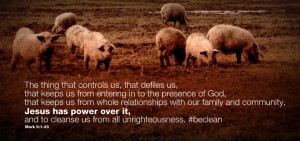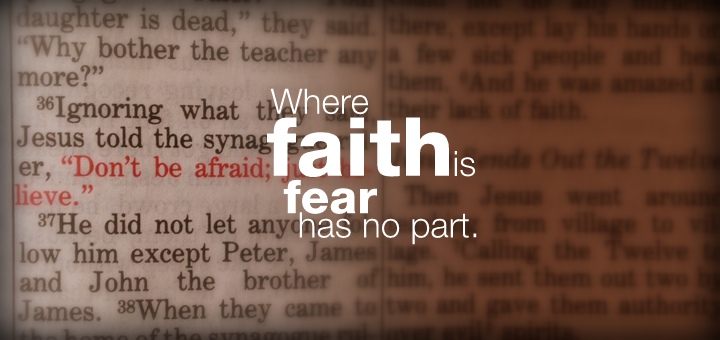Mark 5:35 says that while all this was happening, something terrible had happened elsewhere. Jairus had come to Jesus and begged him to come back to his home and heal his daughter, who had fallen ill. And a few verses earlier they had said she was dying, but now these men run up to Jesus and Jairus with terrible news: the girl is dead.
Darkness.
I can’t imagine the darkness that fell over Jairus.
He had just watched this woman healed of her sickness; certainly, he believed, Jesus could also heal his own daughter… and now it was too late—at least it seemed so.
The fact that this 12-year-old girl had now died separates the work that Jesus is about to do from any natural work that could be attributed to a physician. You see, Jesus, because of his nature, has power beyond healing. He has the power to heal, as he demonstrated in Mark 5:34, but he also has the power to give life.
Be not afraid.
Jesus’ response to Jairus is that where faith is, fear has no part. Since he believed Jesus had the power to heal, he should have no less faith that Jesus also had the power to raise the dead. And in Mark 5:36, Jesus looks into the eyes of Jairus and he says to him, “Don’t be afraid; just believe.”
You see, to Jesus, death has no more power than sleep. In fact, His power is so great, that he needs only to call her by his voice to wake her up. Sure, the girl was dead, but it was to Jesus as if she were sleeping. So when they arrive at the house, Jesus takes in Peter, James and John, and Jairus and his wife. And he goes into the place where this little girl lay.
And though all this time, the story was originally recorded in Greek, here the writer makes it clear that Jesus spoke to the little girl in Aramaic… the household language… the one the little girl knew. And he spoke to her in endearing terms, commanding her to rise. Which she did.
Be raised.
He did not raise her for her own sake—because we can assume that in death she would have been with her heavenly father—he raised her for the sake of her grieving earthly father.
The uncomfortable laughter of the family and neighbors which reinforced the reality of her death—saying, that’s not possible—when Jesus commanded her to rise, now turned to astonishment at his power.
What he had done, they could not understand.
But for her father, whose faith had just been strengthened by his witness of the woman healed, now had his faith strengthened again by the witness of his daughter raised from the dead.
The truth is, we may walk in fear of many things: of failure, or illness, or being left alone, or being harmed or threatened. But we have no reason to fear when we believe that Christ has power over life and death. While we may not have been present to see him raise this girl to life, we know that he has done far greater, in that he, himself conquered death and was raised to life.
The dead have no power to raise themselves, but Jesus does.
Again, like the woman was healed in a moment, this girl did not recover slowly, but as a child would awake from a long rest: eager to get up, to eat and to live.
Jesus put aside the darkness of fear and death and raised this girl to life.
Whatever darkness or fear consumes you, Jesus shines a light in that place, to turn our eyes heavenward to him, for he alone has the power to give us life.
Read the previous posts in this series:
Power over the body (be healed) and the soul (be at peace)

Power over your sin. (Be clean.)

Power over the wind and the sea. (Be still.)


antastic inference, great inspiration, reading provides forthe deepening of faith roots of faith to be deepened